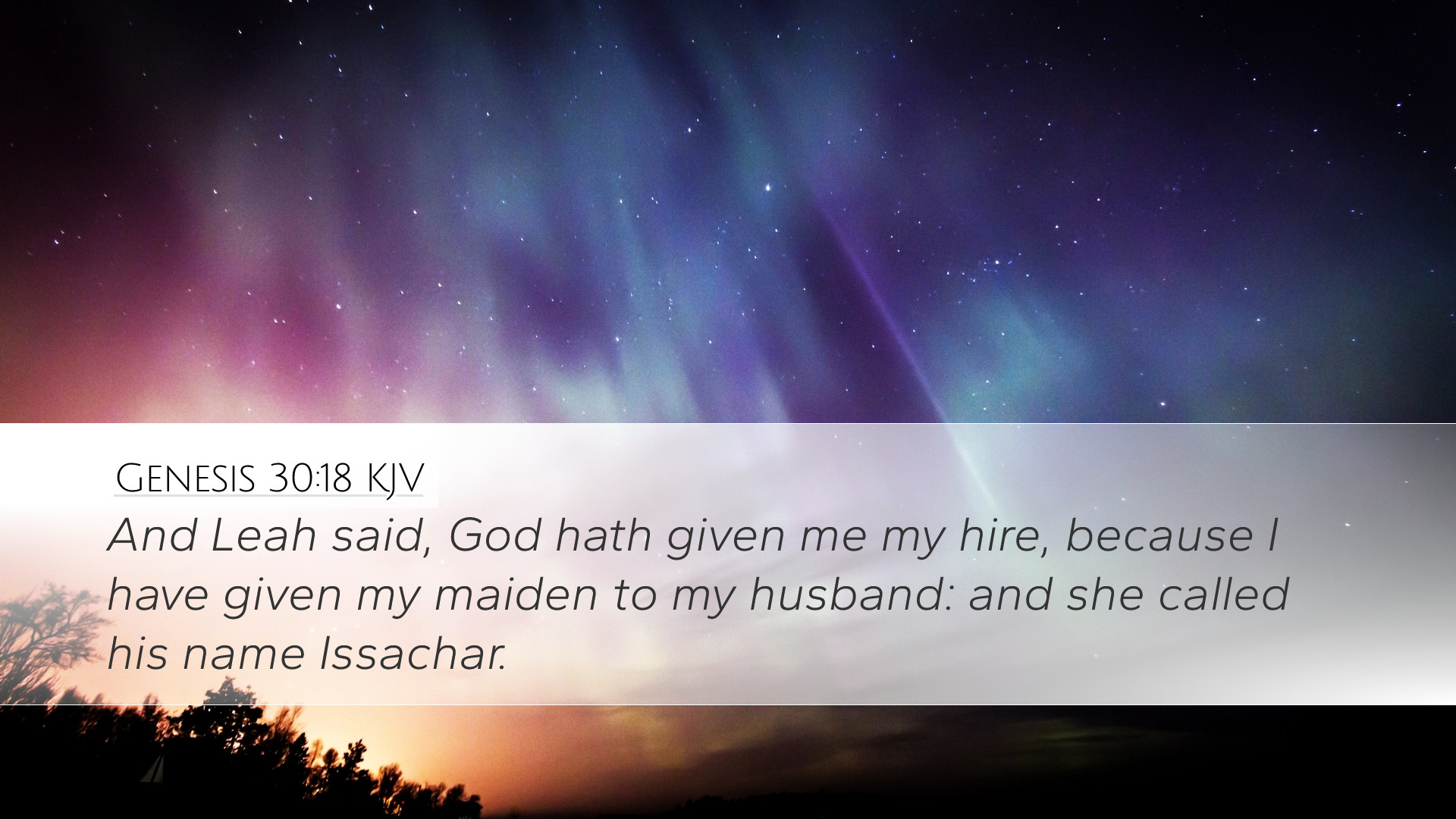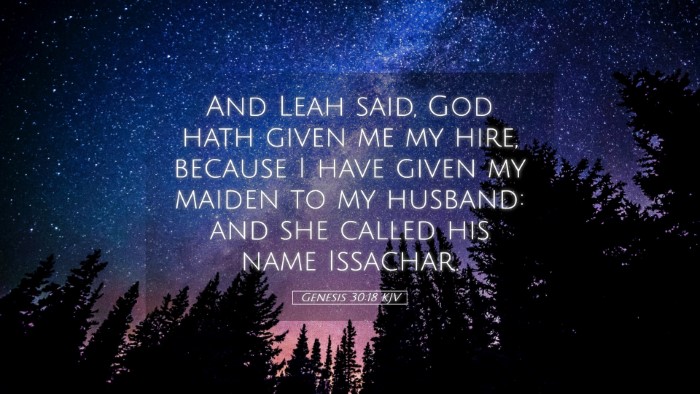Commentary on Genesis 30:18
Verse Text: "And Leah said, 'God hath given me my hire, because I have given my maiden to my husband: and she called his name Issachar.'
Introduction
Genesis 30:18 marks a pivotal moment in the narrative of Jacob's family, particularly in the context of Leah, Jacob's first wife, and her struggle for recognition and love in the face of her sister Rachel's beauty and favored status. This verse not only reveals the dynamics of familial relations but also brings to light the sovereignty of God in the allocation of blessings.
Contextual Background
The verse takes place during a period of intense competition between Leah and Rachel, as both women vie for Jacob's love and favor. The concept of "hire" in this context reflects the transactional nature of their relationships—Leah sees the birth of Issachar as a reward from God for offering her maid to Jacob, which is a common custom in their cultural setting. This illustrates themes of worthiness and divine favor.
Key Themes
- Divine Sovereignty: The verse emphasizes God’s role in granting children, especially in the complicated relationships between Leah and Rachel. Matthew Henry notes that this acknowledgment frames Leah's understanding of her life circumstances as being under the divine hand.
- Labor and Reward: The term "hire" used by Leah reflects the idea of labor leading to reward. This is a profound statement on the nature of work and its acknowledgments by God, which Albert Barnes expands upon by linking it to the broader theme of faithfulness leading to divine recompense.
- Identity and Recognition: Leah, often overshadowed by Rachel, seeks identity and affirmation through motherhood. This longing for recognition resonates deeply with many, showcasing the human desire for validation. Adam Clarke suggests that Leah's joy in naming Issachar signifies a moment of empowerment and personal achievement.
Verse Analysis
“And Leah said…” This introduction sets the tone for Leah's proclamation. It is personal and relational, indicating her feelings and the motivations that underpin her words.
“God hath given me my hire…” Leah recognizes God's hand in her life. This statement is an acknowledgment of divine provision and serves as a reminder to readers that everything we possess is ultimately from God. Henry points out that Leah's perspective on receiving children as “hire” reflects her understanding of her sacrifices and her plea for recognition.
“because I have given my maiden to my husband:” Here, Leah's use of the term “given” highlights her willingness to share her husband with her maid, a cultural norm of the time. This act reflects her desperation to bear children and earn her husband’s affection, serving as a commentary on societal pressures that women faced. Clarke notes that Leah hoped this would earn her favor from Jacob, illustrating the intertwined complexities of love, family, and duty.
“and she called his name Issachar.” The naming of Issachar signifies a marked moment where Leah perceives a change in her fortunes, aligning her personal history with broader redemptive themes within Scripture. Barnes points out that the name itself means "He will bring a reward," encapsulating Leah's belief that God has acknowledged her efforts and granted her a child as a reward for her labor and faithfulness.
Theological Implications
This verse can be examined through various theological lenses:
- Sovereign Love: Leah's recognition of God’s agency in her life calls into question the ways in which we perceive divine favor and love. The complexities of familial love and recognition found in this narrative can provoke much thought regarding God's unconditional love for humanity amidst rivalry and struggle.
- The Role of Women in Scripture: Leah’s story is a compelling narrative that illustrates the broader experiences of women in biblical times. Her struggles for love and significance compel modern readers to reflect on the historical roles of women and the value God places on their lives and contributions.
- Human Agency and Divine Providence: Leah's actions prompt discussions about the interplay between human decisions and divine sovereignty. While Leah takes initiative in bear children, it is ultimately God who grants her this favor, prompting ongoing theological exploration of how human actions correlate with God's overarching plan.
Personal Reflection
The struggles depicted in Genesis 30:18 resonate with many individuals today. Leah's longing for recognition and her attempts to seek it through her children is reflective of the broader human experience. The acknowledgment of God's grace in our pursuits and the understanding of our worth in His eyes can inspire those in ministry and scholarship to approach their roles with humility and assurance.
Conclusion
Genesis 30:18 not only serves as a historical account but also as a profound reminder of God's involvement in the personal and communal lives of humanity. The complexities of Leah's situation and her subsequent declaration about Issachar offer rich terrain for reflection on divine favor, the intricacies of family dynamics, and the importance of recognizing God's gifts in our lives. Pastors, students, and scholars alike can find much to ponder in this narrative as they navigate their own quest for identity and meaning within their spiritual journeys.


